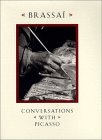I've been skeptical of painters for many years – some, it seems to me, are outright frauds, mere ad men selling middling images, like Warhol. And yet I've always been strangely fascinated with painters and they amount to some of my favorite people of all time. So it will not surprise that Picasso has always been a source of peculiar fascination for me. Of course I'd seen his seminal work and I never doubted his genius, but I never quite understood the precipitous reverence for the man of whom it was once claimed that only God created more. But I slowly started poking around: starting with Arianna Huffington's short, gossipy, and guilty-pleasure read, Picasso; watching Anthony Hopkins in the execrable Surviving Picasso (quite faithful to the Huffington book); and reading Norman Mailer's admirable, if misfired, Portrait of Picasso As a Young Man. Still, nothing. No rousing of the fire. But then I came across Henri-Georges Clouzot's film, The Mystery of Picasso, which was a documentary of sorts that filmed Picasso painting. It's a bit of a stunt, won't interest everyone, but I was mad for it, enraptured, and at the finish, I raised my fist to the sky in celebration of what I saw. Witnessing Picasso's radiant creativity in the very act, stroke by color by stroke by obliteration into sensation and thought into life extraordinaire – well, raw creative power like that is like sitting through a thunderstorm with heavy rains and the sun still shining strong. Seeing Picasso paint made me understand what genius means; I see everything by Picasso differently now. Which finally brings me to Brassaï's Conversations with Picasso. As much a biography as a series of conversations, but a biography of the epoch as well, when so many titans still reigned and called Paris home. The book is filled with the personalities who drop into Picasso's orbit, like Paul Eluard, Matisse, Braque, Henry Miller, Dali, Man Ray, Andre Breton, Apollinaire, Miro, Andre Malraux, Cocteau, Sartre, Camus, de Beauvoir, Max Jacob, and many, many others – it's dizzying and I've forgotten more than I remember so I will list no more. Can I say it is a definitive work? No. But reading this book fits Picasso the personality into the demoniacal force that I watched paint in the Clouzot film.

